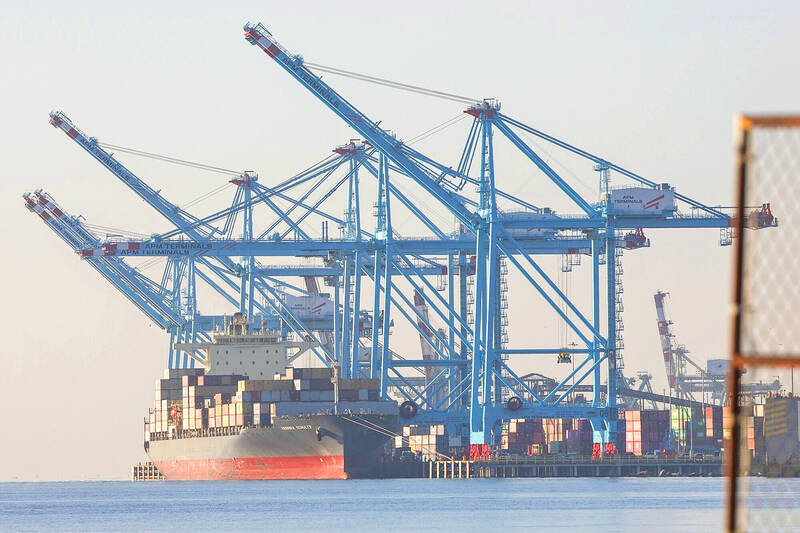US east and Gulf coast port workers were set to go on strike last night with no talks scheduled to head off a stoppage threatening to halt container traffic from Maine to Texas and cost the US economy as much as US$5 billion a day.
The labor contract between the International Longshoremen’s Association union representing 45,000 port workers and the United States Maritime Alliance (USMX) employer group was to expire last night, with negotiations at an impasse over pay.
A port strike would go ahead starting today at 12:01am local time, the union said on Sunday.

Photo: Bloomberg
The USMX “refuses to address a half-century of wage subjugation,” the union said in a statement.
If union members do walk off the job, it would be its first coast-wide strike since 1977, affecting ports that handle about half of the nation’s ocean shipping.
No negotiations are taking place and none were planned before the deadline, a person familiar with the matter said on condition of anonymity.
The union has previously said the strike would not impact military cargo shipments or cruise ship traffic.
However, a strike could stop the flow of everything from food to vehicles at major ports, potentially jeopardizing jobs and stoking inflation weeks ahead of the US presidential election.
Business Roundtable, which represents major US business leaders, said it was “deeply concerned about the potential strike at the east coast and Gulf coast ports.”
The group said a labor stoppage could cost the US economy billions of dollars daily, hurting businesses, workers and consumers across the country.
A short strike could have a limited economic impact given many companies have imported extra goods ahead of a possible work stoppage or shifted more shipments to west coast ports. However, a strike that continues for weeks could have serious economic impacts.
The strike could wedge labor-friendly US President Joe Biden into a no-win position as US Vice President Kamala Harris runs a razor-tight election race against former US president Donald Trump.
Biden on Sunday said he did not intend to intervene to prevent a walkout if dock workers failed to secure a new contract.
US presidents can intervene in labor disputes that threaten national security or safety by imposing an 80-day cooling-off period under the federal Taft-Hartley Act, forcing workers back on the job while negotiations continue.
Retailers that account for about half of all container shipping volume, and are headed into their all-important winter holiday sales season, have been busily employing backup plans.

GROWING OWINGS: While Luxembourg and China swapped the top three spots, the US continued to be the largest exposure for Taiwan for the 41st consecutive quarter The US remained the largest debtor nation to Taiwan’s banking sector for the 41st consecutive quarter at the end of September, after local banks’ exposure to the US market rose more than 2 percent from three months earlier, the central bank said. Exposure to the US increased to US$198.896 billion, up US$4.026 billion, or 2.07 percent, from US$194.87 billion in the previous quarter, data released by the central bank showed on Friday. Of the increase, about US$1.4 billion came from banks’ investments in securitized products and interbank loans in the US, while another US$2.6 billion stemmed from trust assets, including mutual funds,

Micron Memory Taiwan Co (台灣美光), a subsidiary of US memorychip maker Micron Technology Inc, has been granted a NT$4.7 billion (US$149.5 million) subsidy under the Ministry of Economic Affairs A+ Corporate Innovation and R&D Enhancement program, the ministry said yesterday. The US memorychip maker’s program aims to back the development of high-performance and high-bandwidth memory chips with a total budget of NT$11.75 billion, the ministry said. Aside from the government funding, Micron is to inject the remaining investment of NT$7.06 billion as the company applied to participate the government’s Global Innovation Partnership Program to deepen technology cooperation, a ministry official told the

Taiwan Semiconductor Manufacturing Co (TSMC, 台積電), the world’s leading advanced chipmaker, officially began volume production of its 2-nanometer chips in the fourth quarter of this year, according to a recent update on the company’s Web site. The low-key announcement confirms that TSMC, the go-to chipmaker for artificial intelligence (AI) hardware providers Nvidia Corp and iPhone maker Apple Inc, met its original roadmap for the next-generation technology. Production is currently centered at Fab 22 in Kaohsiung, utilizing the company’s first-generation nanosheet transistor technology. The new architecture achieves “full-node strides in performance and power consumption,” TSMC said. The company described the 2nm process as

Even as the US is embarked on a bitter rivalry with China over the deployment of artificial intelligence (AI), Chinese technology is quietly making inroads into the US market. Despite considerable geopolitical tensions, Chinese open-source AI models are winning over a growing number of programmers and companies in the US. These are different from the closed generative AI models that have become household names — ChatGPT-maker OpenAI or Google’s Gemini — whose inner workings are fiercely protected. In contrast, “open” models offered by many Chinese rivals, from Alibaba (阿里巴巴) to DeepSeek (深度求索), allow programmers to customize parts of the software to suit their